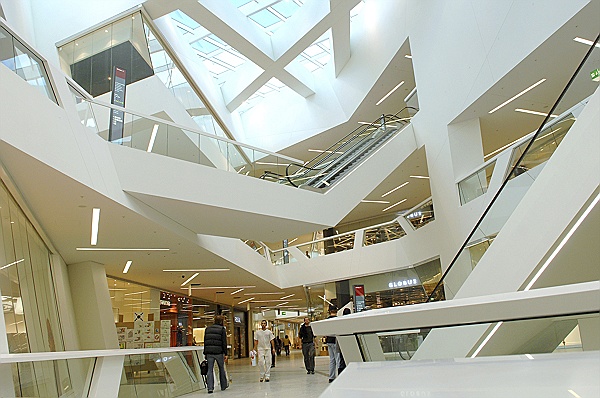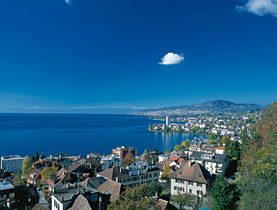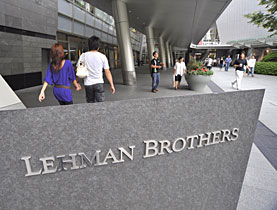Switzerland remains most competitive country

Switzerland has retained its position at the top of the overall rankings in the Global Competitiveness Report 2010-2011 of the World Economic Forum.
Published on Thursday, the report said Switzerland had “an excellent capacity for innovation” and a “very sophisticated business culture” – categories where it ranked second and fourth out of 139 countries.
“Switzerland’s scientific research institutions are among the world’s best, and the strong collaboration between the academic and business sectors, combined with high company spending on R&D, ensures that much of this research is translated into marketable products and processes,” according to the 53-page report.
The WEF report also cited the nation’s strong intellectual property protection and government support of innovation as assets, noting that Switzerland has one of the world’s highest rates of patenting with 159 per million residents.
In comparison, the United States fell two places to fourth, overtaken by Sweden and Singapore, after already ceding the top place to Switzerland last year. Britain moved up a slot to 12th place.
Ranking basis
The rankings consider a dozen pillars of competitiveness: institutions, infrastructure, macroeconomic environment, health and primary education, higher education and training, goods market efficiency, labour market efficiency, financial market development, technological readiness, market size, business sophistication and innovation.
Each pillar has a list of categories; Switzerland took first place in several of these, including quality of railroad infrastructure, country credit rating and availability of financial services.
Switzerland’s macroeconomic environment, after weakening slightly in 2009, bounced back and was among the most stable in the world (it ranked fifth) at a time when many countries are struggling in this area.
The 12 pillars are calculated using publicly available data as well a comprehensive annual survey conducted by the WEF together with its partner institutes. The Executive School at St Gallen University carried out the survey within Switzerland.
High-level input
“We approached CEOs and company presidents active in various branches across the nation. About eight per cent agreed to complete the 20-page questionnaire,” explained the Executive School’s Beat Bechtold, who served as the project leader.
Their biggest gripes were government bureaucracy, tax and labour regulations.
“Actually, I was a little bit surprised that they complained about inefficient bureaucracy because Switzerland was ranked as efficient compared with other nations,” Bechtold told swissinfo.ch.
As he pointed out, business leaders have especially high expectations; waiting a few days for a work permit might seem long to a Swiss hiring manager, but that’s fast compared with many other countries.
Similarly, the strict opening hours designed to protect workers might frustrate someone running a chain of shops.
Staying competitive
While Switzerland demonstrated many competitive strengths, the report said the university enrolment rate of 49.4 per cent continues to lag behind many other high-innovation countries, placing it 48th on this indicator.
With an eye to the future, the authors said efforts should be made to boost higher education attainment to ensure sufficient national talent to continue contributing to productivity improvements.
According to the report’s authors, the information behind the rankings is particularly interesting because it shows what business leaders see as priorities for a given country.
“What’s very useful about this report is that it takes a longer-term view and it allows us to think beyond the business cycle and think about things that need to be done in terms of investments in human resources and infrastructure that will be really important for driving productivity and prosperity,” said Jennifer Blanke, head of the WEF’s Global Competitiveness Network.
To stay high in the ranking, Switzerland must focus on its strengths, said Bechtold.
“Switzerland needs to support the areas where we have a good rating from business leaders. The government should keep business concerns in mind and limit regulations that hinder it.”
#1 Switzerland
#4 United States
#10 Canada
#12 Britain
#16 Australia
#23 New Zealand
#29 Ireland
Population
7.6 million
GDP
$494.6 billion
GDP per capita
$67,560
GDP as share of world total
0.45%
The World Economic Forum started life as the European Management Forum in 1971.
Formed by German-born businessman Professor Klaus Schwab, it was designed to connect European business leaders to their counterparts in the United States to find ways of boosting connections and solving problems.
It is a non-profit organisation with headquarters in Geneva and is funded by the varying subscription fees of its members.
The forum took its current name in 1987 as it broadened its horizons to provide a platform for finding solutions to international disputes. WEF claims to have helped calm disputes between Turkey and Greece, North and South Korea, East and West Germany and in South Africa during the apartheid regime.
WEF conducts detailed global and country specific reports and conducts other research for its members. It also hosts a number of annual meetings – the flagship being Davos at the beginning of each year.

In compliance with the JTI standards
More: SWI swissinfo.ch certified by the Journalism Trust Initiative



You can find an overview of ongoing debates with our journalists here. Please join us!
If you want to start a conversation about a topic raised in this article or want to report factual errors, email us at english@swissinfo.ch.